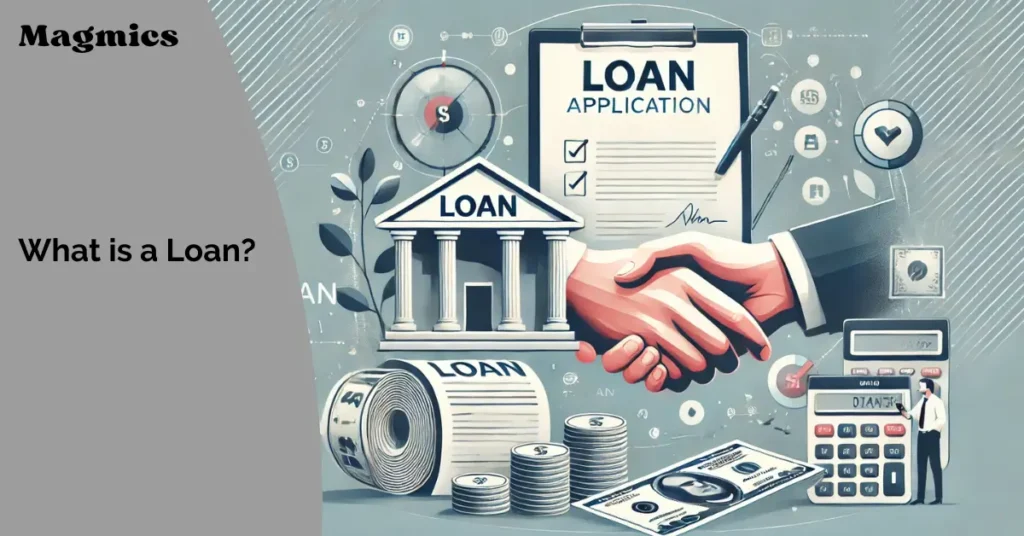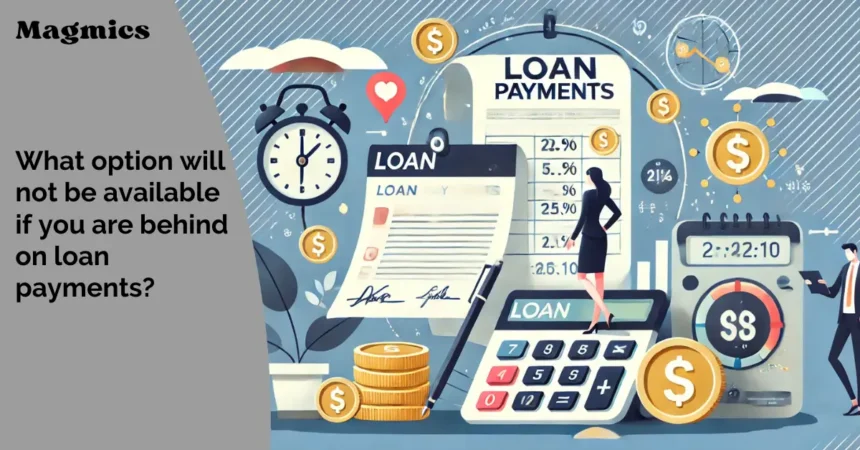What option will not be available if you are behind on loan payments? Falling behind on loan payments is a common financial challenge. This article explains the consequences and what options may no longer be accessible to borrowers who fail to stay current. Understanding these outcomes can help you manage your finances wisely and explore solutions if you struggle to pay.
Key Points:
- What option will not be available if you are behind on loan payments: You may not be able to refinance, get new loans, or lower your interest rate.
- Missing payments can hurt your credit score, making it harder to borrow money later.
- Lenders might not allow you to adjust your payment plan or loan terms.
- If your loan is tied to something like a car or house, you could lose it if you don’t pay.
- Lenders may charge extra fees or take legal steps to recover their money.
What is a Loan?

A loan is money you borrow from a person, bank, or company. You agree to pay it back later, often in small parts over time.
When you borrow money, you also pay extra money, which is called interest. Interest is the cost of borrowing. For example:
- If you borrow $1,000, you might need to pay back $1,100.
- The extra $100 is the interest.
So, a loan is money you borrow and pay back with extra money added.
What option will not be available if you are behind on loan payments?
If you miss loan payments, it can make managing your money more difficult. Here are some options you might lose:
Refinancing Your Loan
Refinancing means changing your loan to get better deals, like smaller payments or a lower interest rate. To refinance, you must pay your loan on time.
Getting New Loans
When you miss payments, it is reported to credit companies, which lowers your credit score. A low credit score makes it harder to get new loans.
Loan Modifications
Some lenders might help by changing your loan, like lowering the amount you pay each month or giving you more time to pay.
Debt Consolidation
Debt consolidation combines all your loans into one, so it’s easier to manage. But to get this, you usually need a good credit score.
Credit Cards or Lines of Credit
Missing payments lowers your credit score, making it harder to get new credit cards or borrow more money on your current cards.
Access to Collateral in Secured Loans
Secured loans, like car or home loans, use your car or house as a guarantee. If you miss payments, the lender can take these back.
Read Also: Abby Phillip Net Worth and Salary: Insights into Her Success
What Happens If You Miss A Loan Payment?
The bank may charge a late fee if you fail to make a loan payment. Your credit score may be lowered if the payment is more than 30 days past due since it may be reported to credit agencies. Later loan applications may be more difficult as a result.
If the loan is secured, the lender may take legal action or seize your home or vehicle if you don’t make payments for a long time.
How Falling Behind on Loan Payments Impacts Your Credit Score
Your credit score reflects your financial trustworthiness. Missing even a single monthly payment can lower it significantly. For borrowers already struggling, repeated delays can make it harder to qualify for loans with lower interest rates in the future.
To protect your credit, consider speaking with your lender right away or exploring payment plans.
Which Options May Not Be Available If You Are Behind on Loan Payments?
If you are behind on loan payments, here are the options that may no longer be available:
Refinancing Your Loan
Refinancing allows you to change your loan to get better terms, like lower interest or smaller payments. If you’re behind, lenders might not approve this option.
Getting New Loans
When you are behind on payments, your credit score might drop. This makes it harder to qualify for new loans, and if you do, you may face higher costs.
Lowering Interest Rates
Lenders often offer lower interest rates to reliable borrowers. If you’re behind, you might not qualify for these offers.
Changing Loan Terms
Some lenders allow borrowers to adjust payments or extend loan terms. Falling behind might make lenders unwilling to give you this option.
Getting Credit Cards
Missing payments can lower your credit score, making it difficult to get new credit cards or increase the limit on current ones.
Using Collateral
For secured loans like car or home loans, lenders might take back the item (like repossessing your car or foreclosing your home) if you don’t pay on time. This removes your ability to use those assets for financial help later.
Understanding the Consequences of Default
Defaulting occurs after prolonged missed payments. It may result in:
- Legal action by your lender.
- Damage to your credit history and future borrowing ability.
- Seizure of collateral for secured loans.
To prevent default, contact your lender early to explore options like debt management plans.
How Late Payments Affect Your Credit Report

What option will not be available if you are behind on loan payments? When you pay late, it is reported to credit companies and stays on your record for years. This can:
- Make it harder to get loans or credit in the future.
- Cause higher interest rates if you borrow money again.
- Make it difficult to rent a house or get a job because of bad credit.
Paying on time can help you avoid these problems.
How Late Payments Affect Your Financial Options
| Impact of Late Payments | Details |
| Loan Approval | Harder to get new loans or credit cards due to a poor credit history. |
| Interest Rates | Higher interest rates on future loans because of a lower credit score. |
| Borrowing Limit | Reduced borrowing amounts offered by lenders. |
| Housing Opportunities | Difficulty renting a home due to poor credit records. |
| Job Opportunities | Some employers may reject applications based on bad credit reports. |
| Loan Repayment Terms | Stricter terms for repayment, making borrowing more expensive. |
This table shows how late payments can affect your ability to borrow, rent, or find a job.
Can You Refinance Your Loan If You’re Behind?
You might still be able to refinance your loan, but it can be hard if you are behind on payments. Most lenders want borrowers with a good credit score and a record of paying on time.
If you have missed payments, they may not approve your request. You can ask for help from nonprofit credit counseling agencies, which can guide you to other options if refinancing is not possible.
How a Counseling Agency Can Help Borrowers in Trouble
What option will not be available if you are behind on loan payments? A nonprofit credit counseling agency can help borrowers who are struggling with money. Here’s how they can help:
Help with Budgeting
They can help you make a simple budget to manage your money better and keep up with payments.
Talk to Lenders for You
They can contact your lender and try to get better payment plans or lower interest rates.
Combine Your Loans
They can help you combine all your loans into one payment, which is easier to manage.
Stop Bigger Problems
They can help you avoid serious issues, like defaulting on your loan or legal trouble.
Teach Money Skills
They offer advice and teach you how to handle money better in the future.
Why Legal Action May Be Taken Against You
If you keep missing loan payments, your lender might take legal action to get their money back. This can lead to serious consequences, such as taking a part of your wages (wage garnishment), placing a claim on your property (a lien), or getting a court order that could affect your finances.
It’s important to talk to your lender if you are struggling to pay, as they might offer solutions to avoid legal trouble.
How Nonprofit Credit Counseling Agencies Provide Support
Nonprofit credit counseling agencies provide valuable help for borrowers who are struggling with loans. They assist in avoiding serious issues like default by offering practical ways to manage your payments.
They can help you create a simple budget to organize your spending and save money for future payments. These agencies also talk to your lender for you, negotiating better terms such as lower monthly payments or more time to pay off your loan.
Tips for Negotiating Loan Terms with Lenders
Talking to your lender can help you manage your loan better. Here are some simple tips:
Change Your Payment Dates: Ask if you can move your payment date to match when you get paid.
Lower Your Monthly Payment: Talk to your lender about making smaller payments or paying over a longer time.
Delay Payments Temporarily: Ask if you can pause your payments for a short time if you are having money problems.
Be Honest About Your Situation: Tell your lender why you are struggling to pay. They are more likely to help if they know your reasons.
Pay What You Can: If you can’t pay the full amount, ask if you can pay a smaller amount for now.
Conclusion: What option will not be available if you are behind on loan payments?
What option will not be available if you are behind on loan payments? If you are behind on loan payments, you may lose important options like refinancing, getting new loans, or lower interest rates.
Lenders might not let you change loan terms or get new credit cards. For secured loans, you could lose your car or house. To avoid these problems, pay on time or talk to your lender for help. Acting quickly can protect your options.
FAQs: What option will not be available if you are behind on loan payments?
What option will not be available if you are behind on loan payments?
You can ask your lender for a new payment plan, more time, or smaller payments. Credit counseling agencies can also help.
What happens if you are behind on loan payments?
The lender may charge late fees, report it to credit companies, lower your credit score, or take legal action.
What is it called when you don’t pay back a loan?
It is called defaulting on the loan.
How to catch up on late payments?
Talk to your lender for a new plan or make partial payments. Credit counseling agencies can also help.
What will happen if a loan is not paid?
The lender may take legal action, charge extra fees, or take assets like a car or house for secured loans.






